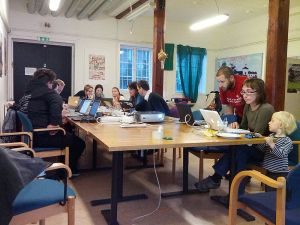(This is a guest post from Pernilla Alexandersson, the Operations manager at Add Gender and a chairman of the trade organization Gender Entrepreneurs in Sweden.)
The mood was high and the conversation passed in waves across the table when I entered an airy conference room at the Solidarity House in Stockholm, Sweden. A group of people was participating in the “Writing cottage on Ada Lovelace Day,” which took place on Wednesday, October 16. That day I learned that on the Swedish Wikipedia, there are four men for every woman who are portrayed at Wikipedia. While this gap is slowly decreasing, it takes a lot of work to change it.

As I expanded an article that another woman on the other side of the table just created in Swedish–about Yahoo!’s president Marissa Mayer–my brain creaked with effort, in a good way. Then I felt it: the wings of history, and when the article was updated, I was so proud! Despite its small mistakes, I was reassured by the the understanding that someone else will take over, perhaps more experienced than me, and expand the article! That’s the beauty of Wikipedia.
Among the many discussions we had as we edited, as a gender expert I was particularly interested in questions of the use of the Swedish terms “masculine” and “feminine.” In the English Wikipedia article for Mayer, it says she was Google’s “first female engineer.” How should I best translate that? In Swedish, we don’t have the perfect word for “female;” in Swedish “hona” refers to animals. So should I translate it as “A woman and an engineer?” or “Feminine engineer?” Is it even important to have this debate? Would anyone write “the first male engineer” for Google’s first employed engineer? Of course not. It is historically significant when the first woman enters a previously male-dominated area – and there’s the context!
In the categories for Wikipedia articles, it seems that the Swedish Wikipedia has solved the problem well: you can search for people by category:women or category:men. In English, “Mathematician” is generally about the mathematician, and there is a special subcategory on “Women in mathematics.” Not at all an optimal solution where women are anomalous and a subcategory of the implied main category: men.
As for the article in question, I strongly opposed the use of the Swedish “feminine” as an alternative to the English “female.” I sought advice in the Wikipedia style guide that evening, and I turned the whole article upside down and felt very proud when I came up with a nifty solution: “the first engineer who was also not a man.” This made me wonder how Wikipedians had written about men earlier. Do men get their personal life pointed out in their stories? Does anyone have the honor of being named as the “first man” in a given field? If you search for this in the Swedish Wikipedia, the result is striking. Over 800 hits for the phrase the “first woman” and a paltry 24 hits for the “first male.”
When men are the first to do something, is it not notable or interesting? Or the areas where women were first, are these the ones worth noting?
Our notions of gender and norms are extremely difficult to see without an outside perspective. Does Wikipedia’s accuracy suffer from the skewed gender distribution among its editors? There are many men who are editing; do they realize that they and society are more familiar with a canon consisting of men and therefore are unreflective about the gender dimension? Do they think about their motivations for selecting what items they translate, create or expand?
I think it’s good that we focus on the Wikipedia gender gap and try to improve it with initiatives like the events organized around Ada Lovelace Day. They increase awareness among Wikipedia editors of their own gender blindness related to what is important on Wikipedia. Our event was a success in numbers: we created or expanded over 20 articles; and I have now made myself a user name. It was also important because it encouraged interesting and instructive discussions.
For example, on the talk page about our project on Wikipedia, someone argued that it is problematic to say that women are “underrepresented,” that more men have meant something to the world’s history and that Wikipedia should be “gender neutral.” Clearly uneven historical narratives do not mean that women are less important to history, nor should Wikipedians be comfortable with this situation. We need to be a modern and knowledgeable group of contributors!
Alas, the morning after the event, I saw that the sentence that I edited, “the first engineer who was not also not a man” was changed back to “feminine engineer.” I immediately felt the desire to argue my case, which you can follow on the talk page of the Marissa Mayer article. We debated the issue and made further edits, finally coming up with a pretty good solution: “In 1999, Mayer was first woman to gain employment as an engineer at Google.”
I suppose only by continuing to edit and debate these issues will we decrease the gender gap on Wikipedia.
Pernilla Alexandersson, Gender Equality Expert, B.A. in Gender Studies and now Wikipedian: Pernillamia

Can you help us translate this article?
In order for this article to reach as many people as possible we would like your help. Can you translate this article to get the message out?
Start translation